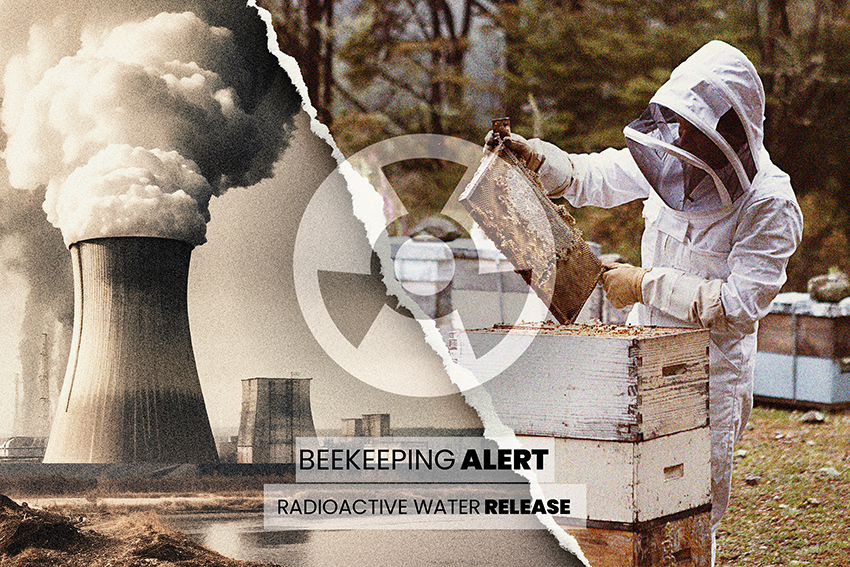Beekeeping Blog
Evaluating the Global Implications of Japan's Radioactive Water Release on the Beekeeping Industry

Introduction
Japan's contentious decision to release treated radioactive water from the Fukushima Daiichi nuclear plant into the ocean has triggered concerns about its potential worldwide environmental consequences. While the immediate ramifications might not be readily evident, the lasting effects on bee health, honey production, and ecosystem stability could reverberate across the global beekeeping industry.
1. Water Contamination and Global Bee Foraging Habits
Bees across the world rely on clean water sources for hydration and forage on diverse flowering plants for sustenance. The introduction of radioactive water into the marine ecosystem has the potential to contaminate water bodies that bees use for hydration on a global scale. If these water sources become polluted, bees could inadvertently carry radioactive water back to their hives, thus endangering their well-being and hive hygiene across different continents.
Furthermore, if flowering plants in various coastal regions absorb pollutants from the contaminated water, bees could potentially collect tainted nectar and pollen on a global scale. This scenario could lead to the widespread presence of radioactive substances in honey, raising concerns about the safety of honey consumption across international markets.
2. Universal Bee Health and Global Ecosystems
Bees play a critical role in pollinating crops and maintaining ecosystem health globally. Any disruption in their health and foraging habits could result in reduced pollination rates and ecosystem instability across different regions. Exposure to radioactive pollutants could compromise the immune systems of bees worldwide, making them more susceptible to diseases and parasites.
Additionally, the accumulation of radioactive materials in bees' bodies over time could lead to widespread colony collapse disorder. This phenomenon could have cascading effects on ecosystems worldwide, affecting plant reproduction, agricultural productivity, and overall biodiversity.
3. Worldwide Economic Consequences
The beekeeping industry is a cornerstone of global food production and economies. Bee-pollinated crops contribute significantly to agricultural revenues across the world. Disruption in bee populations could lead to decreased crop yields and increased production costs for farmers internationally, potentially affecting food security and prices on a global scale.
The potential negative impact on the beekeeping sector could have far-reaching economic implications for beekeepers, honey producers, and related businesses across different countries.
4. Collaborative Mitigation and Vigilance Efforts
Addressing the potential global risks to the beekeeping industry requires collaborative efforts on an international scale. Regular monitoring of water quality in bee foraging areas and water sources across continents is imperative to identify contamination trends. Should contamination be detected, coordinated steps must be taken to minimize exposure and prevent contaminated resources from impacting bee populations worldwide.
International beekeeping communities must be educated about potential risks and equipped with best practices to reduce contamination within hives. This could involve establishing clean water sources near apiaries and adopting consistent strategies to mitigate risks across various regions.
Conclusion
The decision to release radioactive water into the ocean has ignited a global concern. While the immediate consequences on the beekeeping industry might not be immediately apparent worldwide, the long-term effects could be felt across continents. By collectively monitoring water quality, raising global awareness among beekeepers, and implementing coordinated measures to mitigate risks, the international community can work together to protect the global beekeeping industry and the indispensable ecosystem services provided by bees.
In this challenging context, it's imperative that beekeepers worldwide remain vigilant and equipped with the best tools and practices to ensure the health of their hives. One crucial aspect of beekeeping that should not be overlooked is varroa mite treatment. Varroa mites are a significant threat to bee colonies, and effective treatment is essential to maintain bee health and productivity.
At APIBUZZ BEEKEEPING STORE, we understand the importance of combating varroa mites in beekeeping. We offer a range of top-quality varroa mite treatment products specifically designed to protect your hives. Our treatments are trusted by beekeepers worldwide, and we are committed to supporting the beekeeping community in the face of challenges like those posed by the release of radioactive water in Japan.
Visit our store today to explore our selection of varroa mite treatment solutions and ensure the vitality of your bee colonies. Together, we can safeguard the invaluable work that bees do for our ecosystems and our food supply.
